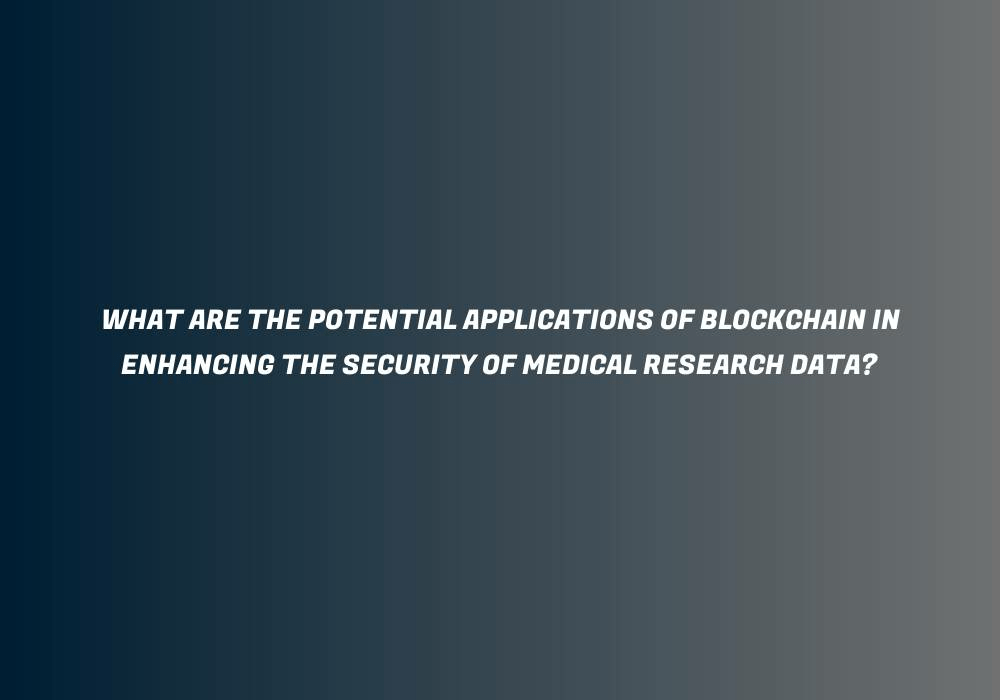In a world where medical research data is increasingly vulnerable to security breaches, the potential applications of blockchain technology offer a promising solution that could revolutionize the way we protect and secure this valuable information. By utilizing the decentralized and transparent nature of blockchain, researchers and medical professionals can ensure the integrity and confidentiality of patient data, while also enabling seamless sharing and collaboration across multiple stakeholders. The potential for blockchain to enhance the security of medical research data holds great promise in advancing medical discoveries and improving patient outcomes.
Potential Applications of Blockchain in Enhancing Medical Research Data Security
Blockchain technology has gained significant attention in recent years, and its potential applications in the healthcare industry, particularly in enhancing the security of medical research data, are promising. With its decentralized and transparent nature, blockchain has the ability to address key challenges related to data integrity, privacy, and trustworthiness. In this article, we will explore the various ways in which blockchain can be leveraged to enhance the security of medical research data and revolutionize the field of healthcare.
Improving Data Integrity and Trustworthiness
Verifying Data Authenticity
One of the primary concerns in medical research is ensuring the authenticity of data. With the decentralized nature of blockchain, data can be securely stored and verified, eliminating the risks of data manipulation or tampering. Blockchain provides a tamper-proof and immutable ledger, where every transaction is recorded and time-stamped. This ensures that the integrity of medical research data is maintained, providing researchers and healthcare professionals with trustworthy and reliable information.
Ensuring Data Immutability
Blockchain technology ensures the immutability of data by using a consensus mechanism to validate and record transactions. Once data is added to the blockchain, it cannot be altered or deleted without the consensus of the network participants. This feature eliminates the risk of unauthorized modifications to medical research data, enhancing its integrity and reliability. By leveraging blockchain’s immutability, medical researchers can have increased confidence in the authenticity and trustworthiness of the data they work with.
Securing Data Transfer and Sharing
Protecting Data During Transit
The transfer of medical research data between institutions or research organizations can be vulnerable to cyber threats and breaches. Blockchain technology provides a secure and encrypted channel for data transfer, protecting it from unauthorized access or tampering. By utilizing cryptographic techniques and decentralized networks, blockchain ensures that only authorized parties have access to the data during transit, significantly reducing the risk of data breaches and maintaining the confidentiality of sensitive information.
Securely Sharing Data Between Institutions
Sharing medical research data across different institutions is crucial for collaboration and advancing scientific knowledge. However, the sharing process often faces challenges related to data security, privacy, and trust. Blockchain can facilitate secure data sharing by allowing institutions to maintain control over their data while still enabling authorized access. Through the implementation of smart contracts and permissioned blockchain networks, institutions can define access controls and consent requirements, ensuring that data is shared only with trusted parties while maintaining the privacy and confidentiality of patient information.
Enhancing Consent Management
Recording and Managing Consent Decisions
Consent management is a critical aspect of medical research, as it ensures that research participants have given informed consent for their data to be used in studies. Blockchain technology can enhance the transparency and reliability of consent management by recording and managing consent decisions on a secure, decentralized ledger. With blockchain, consent records can be securely stored and easily accessible by authorized parties, providing an auditable trail of consent throughout the research process.
Enabling Transparent Consent Tracking
In addition to recording consent decisions, blockchain enables transparent consent tracking. Each transaction on the blockchain is time-stamped and linked to the previous transaction, creating an immutable and transparent trail of consent. This feature ensures that researchers, participants, and regulatory bodies can track the usage of data and verify that it is being used in accordance with the given consent. By enhancing consent management and transparency, blockchain technology can build trust and increase the engagement of research participants.
Facilitating Data Ownership and Control
Allowing Individuals to Control Their Data
In traditional healthcare systems, individuals often have limited control over their data. Blockchain technology can empower individuals by allowing them to control and manage their own medical research data. Through the use of blockchain-based personal data wallets, individuals can securely store and give consent for the usage of their data. This puts the ownership and control of data back into the hands of the individuals, allowing them to decide who can access their data and for what purposes.
Implementing Permissions and Access Controls
Blockchain enables the implementation of granular permissions and access controls for medical research data. Smart contracts can be utilized to define the conditions under which data can be accessed, ensuring that only authorized parties can view or use the data. These permissions can be tailored to meet the specific requirements of different research projects or institutions, enabling fine-grained control over data access and usage. By implementing permissions and access controls through blockchain, the privacy and security of medical research data can be significantly enhanced.
Ensuring Data Privacy and Confidentiality
Protecting Sensitive Information
Privacy and confidentiality are paramount when dealing with sensitive medical research data. Blockchain technology offers a solution to protect sensitive information by using advanced encryption techniques. By encrypting data and storing it on the blockchain, researchers can ensure that only authorized parties with the necessary decryption keys can access the information. This method provides an additional layer of protection against unauthorized access and minimizes the risks of data breaches and privacy violations.
Preserving Patient Anonymity
In some cases, it is necessary to anonymize patient data to ensure privacy and confidentiality. Blockchain can facilitate the anonymization process by replacing personal identifiers with unique, non-identifiable codes. This preserves the anonymity of patients while still allowing researchers to work with aggregated and de-identified data. By incorporating blockchain into the data anonymization process, medical research can strike a balance between data utility and patient privacy, enabling valuable insights while maintaining confidentiality.
Enabling Immutable Data Audit Trails
Recording and Auditing Data Activities
Keeping track of data activities and ensuring transparency in medical research is crucial for maintaining trust and accountability. Blockchain technology provides the capability to record and audit data activities on a decentralized ledger. Every interaction with the data, such as access, modification, or deletion, can be recorded and time-stamped on the blockchain, creating an immutable audit trail. This enables researchers, regulatory bodies, and participants to track and verify the history of data, ensuring its integrity and allowing for a higher level of confidence in research outcomes.
Facilitating Data Provenance Tracking
Data provenance, or the origin and history of data, is of utmost importance in medical research. Blockchain’s immutable nature and transparent record-keeping facilitate data provenance tracking by providing a traceable trail of data from its creation to its usage. By leveraging blockchain for data provenance, researchers can ensure the reliability and authenticity of the data, enhancing the reproducibility of research results and facilitating verification by other researchers or regulatory bodies.
Streamlining Data Management Processes
Automating Data Collection and Validation
Data collection and validation processes in medical research can be time-consuming and prone to errors. Blockchain technology can streamline these processes by automating data collection and validation through smart contracts. Smart contracts can be used to define and enforce data quality requirements, automatically validating the data before it is added to the blockchain. This automation reduces manual effort, minimizes human error, and improves the overall quality and consistency of medical research data.
Improving Data Quality and Consistency
Blockchain-based data management can improve the quality and consistency of medical research data. By implementing validation rules and criteria within the blockchain network, researchers can ensure that only accurate and high-quality data is stored on the blockchain. This eliminates the reliance on manual data validation processes and reduces the likelihood of errors or inconsistencies in the data. Through improved data quality and consistency, blockchain technology can contribute to more reliable research outcomes and accelerate scientific advancements.
Enhancing Interoperability and Data Exchange
Enabling Cross-Institutional Data Sharing
Interoperability and data exchange between different healthcare institutions and research organizations are often hindered by incompatible systems and data formats. Blockchain technology can address these challenges by providing a common and standardized platform for cross-institutional data sharing. By establishing a blockchain network with agreed-upon data standards, institutions can securely share medical research data while ensuring its integrity and interoperability. This seamless data exchange promotes collaboration, accelerates research, and facilitates the development of personalized and evidence-based healthcare solutions.
Improving Data Standardization
Standardization of data formats and terminology is essential for efficient data exchange and integration in medical research. Blockchain can contribute to data standardization by providing a decentralized and consensus-based platform for defining and enforcing data standards. Through the use of smart contracts, blockchain networks can ensure that data is entered in a standardized format, eliminating the need for data transformation and reconciliation. By improving data standardization, blockchain technology simplifies data exchange processes, reduces complexity, and enhances the quality and interoperability of medical research data.
Preventing Data Tampering and Fraud
Detecting Unauthorized Manipulation
Data tampering and fraud pose significant risks to the integrity and reliability of medical research data. Blockchain technology can prevent these issues by providing an immutable and transparent record of data transactions. As every transaction is time-stamped, any unauthorized manipulation of data can be easily detected and tracked on the blockchain. This feature acts as a deterrent against fraudulent activities and ensures that research data remains tamper-proof, providing researchers and regulatory bodies with a trusted source of information.
Ensuring Data Traceability
Traceability of research data is critical for accountability and reproducibility in medical research. Blockchain’s decentralized and transparent nature enables the traceability of data by creating an audit trail that cannot be altered or deleted. This enables researchers and regulatory bodies to verify the validity and authenticity of data throughout the research process. By ensuring data traceability, blockchain technology enhances the credibility of medical research, enables data-driven decision-making, and fosters collaboration among researchers.
In conclusion, blockchain technology has the potential to revolutionize the security of medical research data by addressing key challenges related to integrity, trustworthiness, and privacy. Through its decentralized and transparent nature, blockchain enhances data integrity, secures data transfer and sharing, improves consent management, facilitates data ownership and control, ensures data privacy and confidentiality, enables immutable data audit trails, streamlines data management processes, enhances interoperability and data exchange, empowers patient-centric research, and prevents data tampering and fraud. By leveraging blockchain in medical research, healthcare professionals and researchers can unlock new possibilities, accelerate scientific advancements, and ultimately improve patient outcomes.



